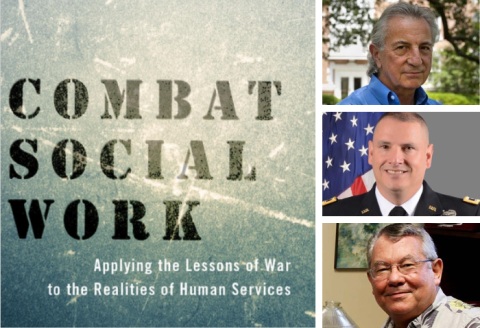Faculty Publishes Book on Combat Social Work

Dr. Bruce Thyer recently published a book in 2020 with his co-editors Dr. Charles Figley and Dr. Jeffrey Yarvis. The book Combat Social Work: Applying the Lessons of War to the Realities of Human Services, published by Oxford University Press, draws attention to the many unsung social work heroes exposed to active combat.
“The idea that social workers are serving in the military comes as a shock to a lot of students. And that they might actually end up in combat situations is very much a surprise,” explained Dr. Thyer. “This is an underappreciated niche of the profession. This book puts a spotlight on what they do.”
Military social work is an area of great interest to many social workers and the US military is a significant employer of licensed clinical social workers (LCSW). Still, their roles are very broad and include mental health/behavioral health, substance use, intimate partner violence and more. Social workers who provide clinical services and see active combat have a distinctive perspective and face unique challenges.
The book consists of chapters from contributing authors who are social workers and have actively served in the military, providing social work and clinical services to military service members. Social workers are commissioned as officers in three branches of the armed services, including the US Army, Navy and Air Force.
Dr. Charles Figley and Dr. Thyer came up with the idea for the book after a book came out about nurses in the military who have experienced active combat. “We thought it made a great topic for a social work book,” said Dr. Thyer.
Each of the book’s editors has first-hand experience in the military and as a social worker and felt the need for a book on combat social work for both military social workers and an increasing number of social work courses covering the topic. All the book chapter contributors also represent the perspectives of social workers within the Army, Navy and Airforce.
The book discusses some of the latest research-based treatments for PTSD and other issues faced by military service members and veterans who have faced active combat. Thyer and his coauthors hope it can be a valuable aid for practitioners and students to understand the needs of this population to better support treatment and recovery.
“Making research-supported treatments more the expectation or default is, in my worldview, a great need,” expressed Dr. Thyer. “So is reaching out to veterans. Many of them are out there right now that don’t seek help. Suicidality is very high in the veteran community. Helping practitioners and students realize they can have a long, useful career in military social work is something I think should be more widely known.”
Dr. Thyer also credits his time in the military as the pathway to his career in social work. Enlisting in the Army in 1973, he was assigned as a neuropsychiatric procedures specialist spending two years in Okinawa, Japan, during the Vietnam War and another year in Maryland. “I was exposed to the operation of a multidisciplinary team consisting of an LCSW, clinical psychologist and psychiatrist,” he recalled. He has served as a social work practitioner for more than 45 years and an educator and scholar for almost 40 years. Dr. Thyer is a distinguished research professor at FSU and a liaison for the FSU Veterans Alliance.
Dr. Charles Figley served in the Marines during the Vietnam war, seeing active combat, and spent time working with veterans coping with their experiences. He is also a former social work professor member at the FSU College of Social Work, serving on the faculty from 1989-2008. Dr. Figley is currently the Tulane University Paul Henry Kurzweg, MD Distinguished Chair in Disaster Mental Health and Associate Dean for Research, School of Social Work Professor, and Director of the award-winning Traumatology Institute. He is credited as one of the researchers to invent the criteria for post-traumatic stress disorder.
Dr. Jeffrey Yarvis is a retired colonel after a 34-year career in the US Army, serving as a social worker in active combat. He is a former doctoral student of Dr. Thyer’s at the University of Georgia and has been a prolific researcher in PTSD and military social work. Dr. Yarvis now serves as a senior professor of practice at Tulane University.
